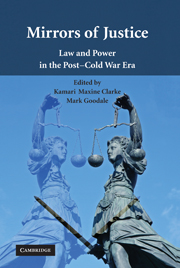Book contents
- Frontmatter
- Contents
- Editor Biographies
- Contributors
- Acknowledgments
- Introduction: Understanding the Multiplicity of Justice
- 1 Beyond Compliance: Toward an Anthropological Understanding of International Justice
- PART I JUSTICE AND THE GEOGRAPHIES OF INTERNATIONAL LAW
- PART II JUSTICE, POWER, AND NARRATIVES OF EVERYDAY LIFE
- PART III JUSTICE, MEMORY, AND THE POLITICS OF HISTORY
- Epilogue: The Words We Use: Justice, Human Rights, and the Sense of Injustice
- Index
- References
Epilogue: The Words We Use: Justice, Human Rights, and the Sense of Injustice
Published online by Cambridge University Press: 25 January 2010
- Frontmatter
- Contents
- Editor Biographies
- Contributors
- Acknowledgments
- Introduction: Understanding the Multiplicity of Justice
- 1 Beyond Compliance: Toward an Anthropological Understanding of International Justice
- PART I JUSTICE AND THE GEOGRAPHIES OF INTERNATIONAL LAW
- PART II JUSTICE, POWER, AND NARRATIVES OF EVERYDAY LIFE
- PART III JUSTICE, MEMORY, AND THE POLITICS OF HISTORY
- Epilogue: The Words We Use: Justice, Human Rights, and the Sense of Injustice
- Index
- References
Summary
Were there no injustice, men would never have known the name of justice.
– Heraclitus nearly 2,500 years agoINTRODUCTION
In this epilogue, my interests lie in the taken-for-granted uses made of words to describe law-related phenomena – justice, injustice, human rights. In national and transnational contexts of power, the ambiguities embraced by words like justice, injustice, or human rights are often there for a purpose – the masking of imperial intent or power disparities that some might call recycled indirect rule. A favored concept may be selected as a distancing mechanism, or the use of a certain word may be the result of confusions. Others may select words to provoke debate in reference to concrete instances or to avoid confrontation by keeping the conversation abstract enough to keep within boundaries. In addition, words like justice may be used to differentiate between us and them, the virtuous and the wild animal, or good and bad scholarship. My professional interest in cultural anthropology lies in understanding the eye that sees, the mind that makes sense of ethnographic findings, and the controlling processes that mediate word use more generally. Simply put, the words we use to discuss law in the making of history often color the content of what we write while also shaping the possibilities for global research efforts to transform human relationships. The process by which words can be made to convey thought is far more complex than is ordinarily understood.
- Type
- Chapter
- Information
- Mirrors of JusticeLaw and Power in the Post-Cold War Era, pp. 316 - 332Publisher: Cambridge University PressPrint publication year: 2009
References
- 3
- Cited by



